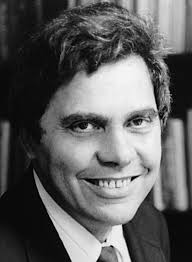So much has changed in life during the span of time I have worked in education. Consider the enormous role social media has played since the turn of the century. It has become something like the social operating system for a new generation of students who have never known life without it. Or think about how the smartphone has become something like a new appendage. We are constantly connected to the internet, running our lives from the device in our pockets. These technological transformations have not only changed society, they have changed us as people. And we need to ask ourselves whether we are truly better for these transformations. We are probably all sleeping worse. We have higher anxiety. And despite the invention of social media, our social interactions seems to bring the worst out of us.

Life comes at us at a furious tempo enhanced by these new technologies. Which leads me to the news. The news is no longer arriving on our doorstep in print form and in our living rooms through three broadcast channels. The news shows up as headlines on our phone’s widget, in our RSS readers, in our social media feeds, not to mention the 24/7 news cycles of multiple broadcast channels. The transformation of the news from the domain of a few professional journalism outlets to the multivarious avenues of delivery today has made a lasting impact on our society, our culture and even our individual psyches. The multiplication of news has not made us a more informed populace. Instead, the phrase “fake news” emerged revealing a deep mistrust in all stripes of news media. In this article I would like to explore a few perspectives that will hopefully enable us to train our students to withstand the onslaught of contemporary news, which I believe has exacerbated the difficult landscape of the post-iPhone era.
The Example of C. S. Lewis
It behooves us to consider the sage advice of C. S. Lewis: read old books. This advice really speaks into our educational renewal movement. It is not that the old books distract us from the present. We are not burying our heads in the sands of days gone by while the world around us burns. No, instead we are gaining valuable perspective. The books that have stood the test of time contain insights that transcend the particulars of any given timeframe. It was said that when Lewis was introduced to a newsworthy event, despite the fact that he didn’t read the news, he had incisive thoughts about current events. This was because his reading of old books informed his thinking so that he could address the pressing concerns of his day from a well-considered perspective. Now, to be fair, Lewis did from time-to-time read the news. It is inevitable that one takes a glance at items of present-day concern. But his regular practice was to ignore the news in preference to literary and philosophical writings.

I remember reading Lewis’s Surprised by Joy and later Alan Jacob’s The Narnian while working on my PhD. At the time I had numerous news sources dumping headlines into my RSS feed. It struck me that Lewis’s habit of ignoring the news might be a way for me to clear out both the time and the headspace to make significant progress on my research and writing. Even though I wouldn’t be up on the latest events when conversing with my colleagues over lunch, it was a sacrifice I was willing to make. Here is the quote that got me started on my journey of giving up on the news, from Surprised by Joy:
Even in peacetime I think those are very wrong who say that schoolboys should be encouraged to read the newspapers. Nearly all that a boy reads there in his teens will be seen before he is twenty to have been false in emphasis and interpretation, if not in fact as well, and most of it will have lost all importance. Most of what he remembers he will therefore have to unlearn; and he will probably have acquired an incurable taste for vulgarity and sensationalism and the fatal habit of fluttering from paragraph to paragraph to learn how an actress has been divorced in California, a train derailed in France, and quadruplets born in New Zealand.
C. S. Lewis, Surprised by Joy (Harcourt, 1955), 159
Some of the key words and phrases that should jump out when reading this passage are “false,” “lost all importance,” “have to unlearn,” “vulgarity,” “sensationalism,” and “habit of fluttering.” This was Lewis in 1955, a decade after World War 2. Consider how much more these words and phrases offer a critique of our social media feeds. We swipe our finger on the iPhone scrolling for that which is sensational, probably vulgar, most likely false but above all is unimportant. As we try to make sense of our world, it turns out the news is one of the worst ways to gauge the way things really are.
The impact on our neurology has far-reaching consequences that we have yet to fully realize. In The Shallows, Nicholas Carr spells out how the internet impacts both our conscious and unconscious thinking as well as rewires our neurological networks. He writes:
The Net’s cacophony of stimuli short-circuits both conscious and unconscious thought, preventing our minds from thinking either deeply or creatively. Our brains turn into simple signal-processing units, quickly shepherding information into consciousness and then back out again.
Nicholas Carr, The Shallows (New York: Norton), 119
As we attempt to interact with our environment to understand the way things really are, the internet prevents us from the kind of deep reflection that would ultimately help us make sense of the world.
News in the Ancient World
If Lewis started me on my journey toward a news-free life, it was my research into the transmission of information in the ancient world that really caught ahold of me. In a world where most people could not read or write, oral communication was the means by which people learned about current events. News as we know it today was issued in the form of public edicts. Official policy was disseminated by written decrees conveyed to public areas such as city marketplaces to be read by town criers. Parchments might be publicly displayed for those who were not present to hear the announced edict. Important and permanent statutes might be displayed as placards or pillars that served public notice of rules and regulations. (see Alan Millard, Reading and Writing in the Time of Jesus, 166-168) The written word was essentially reserved for legal proceedings and official business. Note how edicts were read aloud publicly, since most people were unable to read.

In an oral culture, that which was truly newsworthy spread by word of mouth. At its worst, oral culture perpetuates gossip and misinformation. Yet, the expectation was that rules and regulations announced in the public square would utilize the rapid transmission word-of-mouth communication provided. A Roman authority could dispatch a minimal number of emissaries to strategic locations and know that the message would reach a majority of the populace. The edict read in the marketplace was soon spoken of along the highways and byways of a far-flung empire. Consider the example of the decree that went out from Caesar Augustus in Luke 2:1. Joseph of Nazareth didn’t read about this in a newspaper, it was likely disseminated first from a written edict read aloud in a major city and then spread via word-of-mouth, with the effect that most of the population abided by the regulation to be registered.
Now the point of all of this is that for the majority of history, most of the news that individuals received was learned through relationships, either business (i.e. trips to the marketplace), kinship, or community. The reception of newsworthy information through relationship means you could assess the relative reliability of your sources. If your uncle is a trustworthy, upright citizen, then when he tells you about something, you are inclined to believe it. The other fascinating insight provided by the concept that newsworthy items were received through close relationships is that the “news” was likely to be highly relevant to your daily life. Much of the click-bait types of news about citizens of Rome that would have scintillated the ears of remote Galileans would have been so irrelevant to daily life that it never would have been communicated. So in general the oral-dominant culture of the ancient world actually provided two major filters for newsworthiness: 1) source reliability, and 2) relevance to daily life.
Neil Postman 2.0
In 1985 when Neil Postman published Amusing Ourselves to Death, the cultural artifact that most dominated public discourse was the television. Breaking down that word – tele-vision – provides two developments that can be traced over time. The first part “tele” can be traced back to the telegraph, which was the first technology that Postman shows transformed our culture from a typographical culture to an illuminated screen culture. He writes:
“The telegraph introduced a kind of public conversation whose form had startling characteristics: Its language was the language of headlines – sensational, fragmented, impersonal. News took the form of slogans, to be noted with excitement, to be forgotten with dispatch. Its language was also entirely discontinuous. One message had no connection to that which preceded or followed it. Each ‘headline’ stood alone as its own context. The receiver of the news had to provide a meaning if he could. The sender was under no obligation to do so.”
Neil Postman, Amusing Ourselves to Death (Penguin), 70

Notice the shift from reliability and relevance to irresponsible and irrelevant. No longer did news have to provide the context necessary to make meaning of life or to enable the reader to take action.
“But the situation created by telegraphy, and then exacerbated by later technologies, made the relationship between information and action both abstract and remote.”
Amusing Ourselves to Death, 68
The prefix “tele” means far away. So, “television” means literally “far away vision.” News conducted to us from remote locations requires significant mental work in order to make sense of the context, background and meaning of the information. And yet, the nature of news items is to disseminate information so rapidly, that meaning making cannot happen. This leads to our inability to act on the information we receive through “far away vision.” If something happen in remote Hungary, there’s very little I can do about it. I just have to receive it at an abstract factoid.
“This ensemble of electronic techniques called into being a new world – a peek-a-boo world, where now this event, now that, pops into view for a moment, then vanishes again. It is a world without much coherence or sense; a world that does not ask us, indeed does not permit us to do anything; a world that is, like the child’s game of peek-a-boo, entirely self-contained. But like peek-a-boo, it is also endlessly entertaining.”
Amusing Ourselves to Death, 77
I am reminded of the famous scene in the 2000 film Gladiator where Russell Crowe’s character, Maximus, cries out in the coliseum, “Are you not entertained?” This is perhaps the new, highest value in society. Our pursuit is no longer for happiness, but for entertaining. Have we accepted a cheap substitute for eudaimonia?
“Television, in other words, is transforming our culture into one vast arena for show business. It is entirely possible, of course, that in the end we shall find that delightful, and decide we like it just fine. That is exactly what Aldous Huxley feared was coming, fifty years ago.”
Amusing Ourselves to Death, 80
That was 1985. We are now approaching forty years since Postman wrote this, and therefore almost a century since Huxley wrote Brave New World. Imagine what Postman would have to say about the internet, social media and the smartphone. If a thirty-minute nightly news program on, say, NBC is sensational, fragmented, and impersonal, how much more has our social media feed contributed to this Huxleyan dystopia? The technologies have changed (although they are still “tele-vision”), but Postman’s insight remains just as true today. The internet is really just tele-vision 2.0, so we need all the more Neil Postman 2.0.
Reading Old Books
So how do we lead a resistance to this Huxleyan dystopia? To answer this I return to C. S. Lewis and his advice to read old books. This sage advice comes from an introduction her wrote for an edition of On the Incarnation by Athanasius.
“Every age has its own outlook. It is specially good at seeing certain truths and specially liable to make certain mistakes. We all, therefore, need the books that will correct the characteristic mistakes of our own period.”
With renewed purpose this year, I believe our educational renewal movement has the tools to equip our students with wisdom and knowledge to cut through the click bait headlines of our social media feeds. If nothing else, classical Christian education is about old books. What we mean by old books is the classics, the great books. These have been tried and tested. People come back to them generation after generation finding in them a rich vein of insight, meaning and perspective. Consider this definition of a classic book by Charles Augustin Sainte-Beuve:
“A true classic, as I should like to hear it defined, is an author who has enriched the human mind, increased its treasure, and caused it to advance a step; who has discovered some moral and not equivocal truth, or revealed some eternal passion in that heart where all seemed known and discovered; who has expressed his thought, observation, or invention, in no matter what form, only provided it be broad and great, refined and sensible, sane and beautiful in itself; who has spoken to all in his own peculiar style, a style which is found to be also that of the whole world, a style new without neologism, new and old, easily contemporary with all time.”
Charles Augustin Sainte-Beuve, “What is a Classic?” Harvard Classics, Vol. 32: Literary and Philosophical Essays
Compare this definition to what we find in the news. As classical educators, we have the opportunity to provide the antidote to a sensational, fragmented and impersonal media. What is the great book you will be sharing with your students? What treasure will enrich their minds and yours? When you open that cherished volume, enable them to see the truth, beauty and goodness therein. For from it they will gain so much perspective as to make the news pale in comparison.

One final word. When I previously taught senior history covering the modern world, I had my students read Amusing Ourselves to Death. I found that it provided a sound critique of culture from the World Wars to the present. If you haven’t adopted this work in your high school, it is well worth a look. The first time I worked through it with students, the Hunger Games movies were still fairly recent. They easily made the connections between the dystopian world Suzanne Collins created and the arguments Postman puts forward. At the conclusion of our reading of Amusing Ourselves to Death, I challenged my students to undertake a screen fast. Most of my students had jobs and drove themselves everywhere, so they had to plan ahead to be without phone, tablet, laptop or TV. For instance, I had one student who provided her mom’s number in case of emergencies. The challenge was to go 72 hours without any screen time. Upon completion of the challenge, the student then wrote a reflection on their experience. Some consistent patterns emerged. These students spent more time with family, spent more time outdoors, engaged in more leisure activities, got more sleep, exercised more, and overall felt a greater sense of wellbeing as a result of their screen fast. I even had one student who mentioned she noticed how much the birds sing. If you work with high school or college students, I highly recommend both Postman’s book as well as the screen fast challenge. They can really open the eyes of your students and empower them to enact real change in their lives.




Leave a Reply